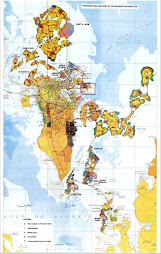,البحرين: في المستوى الثاني -بحسب الخارجية الأمريكية- في تجارة الإتجار بالبشر.
وعليه فهي لازالت في قائمة المراقبة في هذا المجال
U.S. State Dept.Trafficking Report 2009
BAHRAIN:(Tier 2 Watch List)

BAHRAIN (Tier 2 Watch List)
Bahrain is a destination country for men and womentrafficked for the purposes of forced labor and commercialsexual exploitation. Men and women from India,Pakistan, Nepal, Sri Lanka, Bangladesh, Indonesia,Thailand, the Philippines, Ethiopia, and Eritrea migratevoluntarily to Bahrain to work as formal sector laborersor domestic workers. Some, however, face conditionsof involuntary servitude after arriving in Bahrain, suchas unlawful withholding of passports, restrictions onmovement, non-payment of wages, threats, and physicalor sexual abuse.
In addition, women from Thailand, thePhilippines, China, Vietnam, Russia, Ukraine, Morocco,Jordan, Syria, and Lebanon are trafficked to Bahrain forthe purpose of commercial sexual exploitation.The Government of Bahrain does not fully comply withthe minimum standards for the elimination of trafficking;however, it is making significant efforts to do so. Thegovernment achieved its first trafficking conviction in late2008 – a conviction for sex trafficking – and instituted anew visa regime in July 2008 allowing migrant workersto change employers. Despite these significant overallefforts, the government did not show evidence of progressin providing protective services to victims or prosecutingoffenses relating to labor trafficking – the most prevalentform of trafficking in Bahrain; therefore, Bahrain is placed on Tier 2 Watch List.
Recommendations for Bahrain:
Significantly increase the investigation and prosecution of trafficking offenses –particularly those involving forced labor – and convictionand punishment of trafficking offenders; institute andapply formal procedures to identify victims of traffickingamong vulnerable groups, such as domestic workers whohave fled from abusive employers and prostituted women,and refer identified victims to protective services; andensure that victims of trafficking are not punished for actscommitted as a direct result of being trafficked, such asillegal migration or prostitution.ProsecutionThe Government of Bahrain made modest progress inconducting anti-trafficking law enforcement effortsduring the year, prosecuting its first case under itsJanuary 2008 anti-trafficking statute. The Law to CombatTrafficking in Persons prohibits all forms of trafficking inpersons and prescribes penalties ranging from three to15 years’ imprisonment, which are sufficiently stringentand commensurate with those prescribed for othergrave crimes, such as rape. The Ministry of Interior’s 10-person specialized unit investigated trafficking crimes,particularly those involving sex trafficking. It claimedto have disbanded a prostitution ring and rescued 43Chinese women believed to be trafficking victims, but
BAHRAIN 73prosecutors reportedly viewed the evidence as insufficientto pursue legal action.
In December 2008, the PublicProsecutor obtained the conviction of a Thai woman whowas sentenced to three and a half years’ imprisonmentand a $13,250 fine for trafficking three other Thai womeninto commercial sexual exploitation in Bahrain. Duringthe reporting period, the government reportedly closedseveral manpower agencies alleged to have confiscatedworkers’ passports, switched contracts, or withheldpayment of salaries. The government also ordered 12employers to pay back and release their workers. It didnot criminally prosecute any employers or labor agentsfor forced labor of migrant laborers, including domesticworkers, under its new anti-trafficking law.
The law against withholding workers’ passports – a commonpractice that restricts the mobility of migrant workers andcontributes to forced labor – was not enforced effectively,and the practice remained widespread. The Royal PoliceAcademy provided new police recruits with specificinstruction on identifying trafficking victims during thereporting period.ProtectionThe Government of Bahrain did little to improveprotective services available to trafficking victims overthe last year, though it issued new policy guidance onthe employment conditions of migrant workers. The government maintains one floor of its shelter for femalemigrant workers, but did not provide informationregarding the number of foreign workers assisted or thetypes of care the shelter provided to trafficking victims.The majority of victims continued to seek shelter at theirembassies or through the Migrant Workers ProtectionSociety, which in April and July 2008 received a projectgrant of $15,900 from the Bahraini government to operateits shelter. The government did not have a referral processto transfer trafficking victims detained, arrested, orplaced in protective custody to institutions that provideshort- and long-term care. There are no shelter facilities orprotective services for male trafficking victims in Bahrain.
In August 2008, the Ministry of Social Developmentestablished a committee to protect trafficking victims aspart of its obligation under the anti-Trafficking in Personslaw. One of the responsibilities of this committee, as partof the new law, is its approval for trafficking victims toremain in Bahrain pending their traffickers’ prosecution;in the aforementioned case, the Thai victims were offeredthe option of remaining in Bahrain to work, but allthree chose to repatriate to Thailand instead. To addressvulnerabilities to trafficking arising from the migrantlabor sponsorship system, the government launched anew migrant labor visa regime in July 2008 that allows forworkers to change employers and criminalizes the use of“free visas” that often leave workers stranded in Bahrainwithout a job. These regulations do not, however, applyto domestic workers, which are the migrant workers mostvulnerable to forced labor in Bahrain.
The government continued to lack a formal procedure to identify victimsamong vulnerable groups, such as domestic workerswho have left their employers or women arrested forprostitution. As a result, potential trafficking victims mayhave been charged with employment or immigrationviolations, detained, and deported without adequateprotection. Most migrant workers who were able toflee their abusive employers were frequently chargedas “runaways,” sentenced to two weeks’ detention,and deported. Employers also sometimes filed policereports against their runaway workers. The governmentencouraged victims to assist in the investigation andprosecution of their traffickers; however, long andindefinite delays in legal cases, as well as a perceivedbias against foreign workers by judges and prosecutors,discouraged workers from such involvement in criminalproceedings against their traffickers.PreventionThe government’s efforts to prevent trafficking increasedduring the reporting period.
The Ministry of Interior’s Human Trafficking Unit produced a brochure describing Bahrain’s anti-trafficking law and soliciting complaints toits hotline for investigations; it distributed this brochureto at-risk groups upon arrival in the country. The Labor Market Regulatory Authority (LMRA) collaborated with IOM to produce a pamphlet explaining how to legallyobtain a work visa, workers’ rights, and how to reportsuspected violations. Throughout 2008, the CEO of LMRA and the Minister of Labor conducted press conferencesto highlight illegal practices, particularly withholdingof passports, relating to human trafficking. Despite theincreased level of awareness fostered by these campaigns,understanding of what constitutes trafficking remainedlow. Many people, including courthouse clerks, continuedto believe that it is legal to confiscate workers’ passports,despite several instances over the course of the reportingperiod in which the Minister of Labor explicitly statedthat withholding passports is illegal. In March 2009, thegovernment hosted a two-day international conferenceon combating trafficking in persons. In April, June,and July 2008, the government provided services andsupport valued at more than $60,000 that enabled IOMto train 315 civil society volunteers, journalists, foreign diplomats, and government officials in the LMRA and Ministries of Interior, Social Development, Culture and Information Affairs, Foreign Affairs, Labor, and Justice.In July, the government requested and supported atraining and awareness program for its anti-trafficking
http://www.state.gov/g/tip/rls/tiprpt/2009/index.htm







